
News |
- Meteorologists Issue Climate Change Caution
- Wind Project Controversy in Alberta Grasslands
- Wuskwatim Project Gets Green Light
- New Canadian Heritage River - The Hayes River
- Wuskwatim PDA Lacks Information
- Clearing the Air on Climate Change
- Climate Change Could Destroy Insurers
- An Inconvenient Truth Tops Box Office Earnings
- Canada's Mayors to Fulfill Kyoto
- Albertans Want Emissions Neutral Tar Sands
- World Environment Day - Don't Desert Drylands
- Risk For Woodland Caribou Increases
| Meteorologists Issue Climate Change Caution | 20 June 06 |
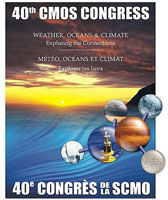 At the conclusion of its 40th Annual Congress, the Canadian Meteorological and Oceanographic Society issued a statement on climate change. Manitoba Wildlands is providing primary quotes from the statement: At the conclusion of its 40th Annual Congress, the Canadian Meteorological and Oceanographic Society issued a statement on climate change. Manitoba Wildlands is providing primary quotes from the statement:"Climate change is happening now, both in Canada and around the world. Most of this change is attributable to human activities that release greenhouse gases into the atmosphere... We call on all levels of government to take immediate action. We must both reduce emissions of greenhouse gases and prepare for climate change." "We urge all governments to work towards a single international agreement to address climate change, as was recognized in the 1992 U.N. Framework Convention on Climate Change." "The Climate Convention's Kyoto Protocol is an important first step towards reducing the release of greenhouse gases into the atmosphere. However, the scientific evidence dictates that in order to stabilize the climate, global reductions in greenhouse gas emissions need to go far beyond those mandated under this Kyoto Protocol. We recognize the challenge of implementing the current agreement; nonetheless we urge Canada to contribute effectively to this global effort." View the 2006 Canadian Meteorological and Oceanographic Society climate change statement (PDF) Source: Canadian Meteorological and Oceanographic Society |
|
| Wind Project Controversy in Alberta Grasslands | 20 June 06 |
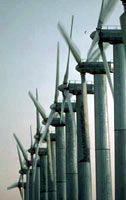 A wind farm proposed in an area of Alberta grasslands surrounding Cypress Hills Provincial Park is drawing criticism from local environmentalists. The Alberta Wilderness Association (AWA) is supportive of renewable energy alternatives, but says that wind farms should be located in appropriate areas and should not fragment sensitive grassland areas that act as a buffer for the provincial park. A wind farm proposed in an area of Alberta grasslands surrounding Cypress Hills Provincial Park is drawing criticism from local environmentalists. The Alberta Wilderness Association (AWA) is supportive of renewable energy alternatives, but says that wind farms should be located in appropriate areas and should not fragment sensitive grassland areas that act as a buffer for the provincial park.AWA is concerned because the project ignores that fact that wind farms are an industrial use of the land. If located in the area of agricultural, native rangeland and grassland, known as 'the Fringe', which surrounds Cypress Hills Provincial Park, the wind farm could fragment sensitive grasslands and bring in aggressive invasive species that can invade the surrounding grasslands. Native fescue grasslands have never been successfully reclaimed. Once they are destroyed they are gone forever. The development would also be in conflict with management goals for 'the Fringe', which includes preserving the high quality native rangelands and the ranching community, and minimizing roads and development. Visit the Alberta Wilderness Association web site Source: Alberta Wilderness Association |
|
| Wuskwatim Project Gets Green Light | 19 June 06 |
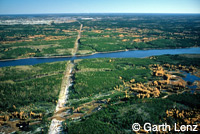 The people of the Nisichawayasihk Cree Nation (NCN) of Nelson House gave the green light to the Wuskwatim Generation project in a June 14, 2006 vote. According to media reports, more than 70% of the community's eligible voters turned out to vote, with 62% voting in favour of the deal in the referendum. The people of the Nisichawayasihk Cree Nation (NCN) of Nelson House gave the green light to the Wuskwatim Generation project in a June 14, 2006 vote. According to media reports, more than 70% of the community's eligible voters turned out to vote, with 62% voting in favour of the deal in the referendum.The deal that NCN voted to approve will give the band the opportunity to buy as much as one-third of the generating station and share in one-third of the profits. It will also receive about $100 million in contracts for the construction process (which it will share with joint venture partners) and more than $10 million in training related to the dam. It will require NCN to invest $1 million immediately. At the end of the six- year construction period - likely about 2012 - it will then have to come up with the rest of the money it wants to invest. In a letter to the editor in the Winnipeg Free Press, Carol Kobliski, Spokesperson for the Justice Seekers of Nelson House criticized Manitoba Hydro and the Manitoba government for only printing 300 copies of the Wuskwatim project development agreement for over 4,000 Nisichawayasihk Cree Nation members to review. (These were not available for almost a month after the announcement of referendum date.) She pointed out that with inflation, cost to build Wuskwatim will rise. As a partner, NCN will have to cover its debt and no one else will be there to guarantee NCN debt payments, while the Manitoba government and taxpayers will cover Manitoba Hydro's debt. As of Monday June 19, no official results of the vote are posted publicly. It was expected, as in most other elections and referenda, that results by day of vote (June 7 & 14), and by polling station (several around Manitoba) would be made available. Concern about past problems with election procedures at NCN prompted the Justice Seekers to request both provincial and federal government supervision of the vote. These requests were also tabled in the Manitoba Legislature on petitions with several hundred signatures. Wuskwatim still also requires provincial and federal approvals for permits and licenses in order to proceed. If this occurs soon, officials expect construction to begin this summer. View the June 15, 2006 Nisichawayasihk Cree Nation press release View the June 15, 2006 Winnipeg Free Press Letter to the Editor (DOC) View the June 15, 2006 Winnipeg Free Press Web Extra article (DOC) View the June 16, 2006 Winnipeg Free Press article (DOC) View the June 15, 2006 CBC Manitoba article Sources: Nisichawayasihk Cree Nation, Winnipeg Free Press, CBC Manitoba |
|
| New Canadian Heritage River - The Hayes River | 16 June 06 |
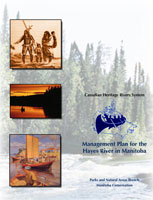 The Hayes River in Manitoba is now a member of the Canadian Heritage Rivers System (CHRS). The announcement was made on June 11, 2006 by Ministerial representatives from both the federal and provincial levels. A CHRS plaque commemorating the Hayes River's addition to the CHRS was part of a ceremony to mark Canadian Rivers Day. The Hayes River in Manitoba is now a member of the Canadian Heritage Rivers System (CHRS). The announcement was made on June 11, 2006 by Ministerial representatives from both the federal and provincial levels. A CHRS plaque commemorating the Hayes River's addition to the CHRS was part of a ceremony to mark Canadian Rivers Day.At the ceremony, Manitoba Conservation Minister Stan Struthers also released the management plan for the Hayes River. The plan, required to achieve Canadian Heritage River status, presents an integrated resource management program that will deal with water quality, public awareness, natural and cultural heritage, and recreational use. Although the designation of the Hayes is an important and welcomed step, it does not protect the waterway or its associated riparian areas from industrial development such as in the case of a national park or provincial protected area. The Canadian Heritage Rivers System is Canada's national river conservation program. The objectives of the CHRS are to give national recognition to Canada's outstanding rivers and to ensure long-term management that conserves their natural, cultural and recreational values. Manitoba Wildlands' Director Gaile Whelan Enns welcomed the Hayes River announcement but also called for formal protection of the river, "We congratulate both the federal and provincial governments for taking this important step. As there is no protection regulation under Manitoba or federal legislation, river cooridors need real protection like the Manigotagan Provincial Park, which protects riparian areas along its banks." View the Manitoba Wildlands Map of the Hayes River View the June 11, 2006 Manitoba and Canada Government press release View the Manitoba Government web site on Hayes River View the Management Plan for the Hayes River in Manitoba (PDF) View the Manitoba Conservation Data Centre web page on the Hayes River View the Canadian Heritage Rivers System web page on the Hayes River Sources: Government of Manitoba, Government of Canada, Manitoba Wildlands |
|
| Wuskwatim PDA Lacks Information | 12 June 06 |
 The Project Development Agreement (PDA) for the Wuskwatim Generation Project between Manitoba Hydro and the Nisichawayasihk Cree Nation (NCN) does not include information required to complete an independent financial review of the agreement for an assessment of the potential implications for the Nisichawayasihk Cree Nation. The Project Development Agreement (PDA) for the Wuskwatim Generation Project between Manitoba Hydro and the Nisichawayasihk Cree Nation (NCN) does not include information required to complete an independent financial review of the agreement for an assessment of the potential implications for the Nisichawayasihk Cree Nation.In a letter dated June 9, 2006, the firm of Gardner Coombs Windsor Coombs Chartered Accountants indicates that they are "unable to complete a detailed financial review of this nature since the detailed financial assumptions are not included in the information contained on the [March 2006 Wuskwatim PDA] CD." The accountants also list the information that is needed yet not provided in the Wuskwatim PDA. Members of the Nisichawayasihk Cree Nation (both on and off reserve) are set to vote on the Wuskwatim PDA on June 14, 2006. The vote requires a double majority in order to be ratified; at least 51% of eligible NCN members must vote and a majority (at least 51%) of those voting must approve the PDA. Community ratification is needed in order for the hydro project to proceed. As well, provincial and federal governments must make decisions as to whether to issue environmental licenses, various permits, and water licenses. View the June 9, 2006 letter to Olthuis Kleer Townshend (PDF) View NCN information about the Wuskwatim Project Development Agreement Visit Manitoba Hydro's web site for the Wuskwatim Projects View the May 11, 2006 Manitoba Wildlands news item View Wuskwatim Projects information on Manitoba Wildlands Source: Olthuis Kleer Townshend |
|
| Clearing the Air on Climate Change | 12 June 06 |
 Noted environmentalist and Officer of the Order of Canada, Elizabeth May, will be in Winnipeg June 20, 2006, 7:30pm, Hotel Fort Garry, in her series of free, public speaking engagements as part of a national speaking campaign. Her topic Clearing the Air on Climate Change addresses the realities and the fallacies of current debates. Noted environmentalist and Officer of the Order of Canada, Elizabeth May, will be in Winnipeg June 20, 2006, 7:30pm, Hotel Fort Garry, in her series of free, public speaking engagements as part of a national speaking campaign. Her topic Clearing the Air on Climate Change addresses the realities and the fallacies of current debates."There is no question that Canada's rising greenhouse gas emissions are largely due to the rapid expansion of the Athabasca tar sands. Each Barrel of Tar Sands Oil produces three times as much Greenhouse Gases as conventionally produced oil. By 2015, each year up to 97 million tonnes of greenhouse gases will come from the tar sands alone. The tar sands are consuming vast quantities of water, as much as 6 barrels of water for every one barrel of oil produced," said Elizabeth May. Recently, Canada's government has been reneging on its international obligations for the first commitment period under Kyoto (2008-2012). Elizabeth May is also promoting her fifth book, How To Save The Planet In Your Spare Time during her speaking tour. View information on the Speaking Tour: Clearing the Air on Climate Change Visit the Mackenzie Wild website Visit the Sierra Club of Canada website View Manitoba Wildlands' pages on climate change Sources: Sierra Club of Canada, Manitoba Wildlands |
|
| Climate Change Could Destroy Insurers | 12 June 06 |
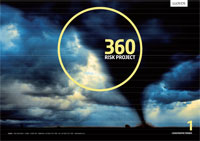 Lloyd's of London, the oldest insurance market in the world, yesterday urged its members to start taking global warming more seriously, by increasing prices to avoid being "swept away" in a sea of future financial claims. Lloyd's of London, the oldest insurance market in the world, yesterday urged its members to start taking global warming more seriously, by increasing prices to avoid being "swept away" in a sea of future financial claims.Premiums will have to rise and some risks might even be classed as uninsurable due to greenhouse gases and rising sea levels, warned Lloyd's in a report entitled Climate Change, Adapt or Bust. "Although it's almost two decades since the UN recognized that climate change was a catastrophic threat to the Earth, it's clear that the insurance industry has not taken catastrophe trends seriously enough. Climate change is today's problem not tomorrow's. If we don't take action now to understand the changing nature of our planet we will face extinction," said Lloyd's director, Rolf Tolle. Insurers should cease to base risk premiums on historical data and do more to look ahead and factor in scenarios connected with climate change, says the report. In the short term the insurance industry will have to invest more time and money in academic research as well as convert scientific predictions into practical guidance for the sector. View the full June 6, 2006 Lloyd's article View the Llyod's report: Climate Change, Adapt or Bust (PDF) Sources: the Guardian, Llyod's |
|
| An Inconvenient Truth Tops Box Office Earnings | 09 June 06 |
 Al Gore's new documentary film, An Inconvenient Truth opens in Winnipeg on June 16th at The Globe theatre. The film, which was well-received following its Canadian premiere in Toronto on May 4th, warns that mankind has about 10 years to act on the impact of greenhouse gases or else the planet faces an environmental catastrophe. However, An Inconvenient Truth also offers solutions and is designed to make a difference in the climate change debate. Al Gore's new documentary film, An Inconvenient Truth opens in Winnipeg on June 16th at The Globe theatre. The film, which was well-received following its Canadian premiere in Toronto on May 4th, warns that mankind has about 10 years to act on the impact of greenhouse gases or else the planet faces an environmental catastrophe. However, An Inconvenient Truth also offers solutions and is designed to make a difference in the climate change debate.Gore has managed to turn the media's attention away from his political and personal issues surrounding his 'defeat' in the 2000 US presidential election and turn the spotlight towards what he calls his 'mission' - to educate the public regarding risks and opportunities associated with climate change. He is campaigning, and his passion for the issue leaves no doubt that this is the race of his life. The film is breaking box office records across the US, according to the International Movie Database and Grist Magazine. "Manitobans are concerned about climate change impacts in our boreal forest regions. Sponsoring An Inconvenient Truth in Winnipeg is an opportunity to support the climate change concerns of Manitobans," said Gaile Whelan Enns, director, Manitoba Wildlands.  Visit Globe theatre website for Winnipeg show times for An Inconvenient Truth
Visit Globe theatre website for Winnipeg show times for An Inconvenient TruthVisit the An Inconvenient Truth website View the June 9, 2006 Grist Magazine Grist List View the May 14, 2006 Wired Magazine article View the May 9, 2006 Manitoba Wildlands news item View the June 16, 2006 Winnipeg Free Press Movie Review Source: Wired Magazine, Manitoba Wildlands, Grist Magazine |
|
| Canada's Mayors to Fulfill Kyoto | 08 June 06 |
 Canada's mayors will not let Prime Minister Steven Harper walk away from Canada's international commitments on climate change without a fight, and like their counterparts in the United States, Canada's mayors intend to work toward the goals of the Kyoto Protocol. At its annual meeting in Montreal early June 2006, the Federation of Canadian Municipalities, representing 1,400 municipal leaders across Canada, adopted a policy statement supporting Canada's ratification of the Kyoto Protocol. Canada's mayors will not let Prime Minister Steven Harper walk away from Canada's international commitments on climate change without a fight, and like their counterparts in the United States, Canada's mayors intend to work toward the goals of the Kyoto Protocol. At its annual meeting in Montreal early June 2006, the Federation of Canadian Municipalities, representing 1,400 municipal leaders across Canada, adopted a policy statement supporting Canada's ratification of the Kyoto Protocol."Municipal governments commit themselves... to implementing policies and operational changes that will achieve a global reduction in greenhouse gas emissions of 30 per cent by 2020 and 80 per cent by 2050, based on 1990 levels," the statement reads. Close to 55 per cent of Canada's greenhouse gas emissions can be influenced by decisions made by municipal governments, according to the statement. Mayors in the U.S. have mounted an aggressive campaign against the anti-Kyoto stance of President George W. Bush and his administration. As of May 26, 2006, 238 mayors representing over 45.4 million Americans have signed the U.S. Mayors' Climate Protection Agreement, pledging "to meet or exceed Kyoto Protocol targets for reducing global warming pollution by taking action in our own operations and communities." Senior policy analyst Mary Jane Middlekoop said, who was asked by one delegate if the organization intends to "raise holy hell" over the issue, replied: "We intend to raise cool hell." View the June 4, 2006 Ottawa Citizen article View the June 4, 2006 The Gazette article Visit the Federation of Canadian Municipalities Sources: Montreal Gazette, Ottawa Citizen |
|
| Albertans Want Emissions Neutral Tar Sands | 08 June 06 |
 An overwhelming majority of Albertans believes the government and industry should do more to protect the environment in the face of oil sands developments in northeastern Alberta, according to a recent poll commissioned by the Pembina Institute. An overwhelming majority of Albertans believes the government and industry should do more to protect the environment in the face of oil sands developments in northeastern Alberta, according to a recent poll commissioned by the Pembina Institute. "The results show Albertans' vision is very different than current plans for oil sands development. A striking 86 per cent of Albertans feel that oil sands operations should be required to reduce greenhouse gas emissions associated with their development," said Simon Dyer, Senior Policy Analyst for the Pembina Institute. Key Findings from the Poll:
Visit the Oil Sands Watch web site Source: The Pembina Institute |
|
| World Environment Day - Don't Desert Drylands | 05 June 06 |
 People around the world are celebrating World Environment Day 2006 on June 5, 2006, while acknowledging the serious message of the celebration - the United Nations is warning that desertification is a main obstacle to ending poverty and can trigger conflicts. The World Environment Day (WED) theme selected for 2006 is Deserts and Desertification and the slogan is 'Don't Desert Drylands!' People around the world are celebrating World Environment Day 2006 on June 5, 2006, while acknowledging the serious message of the celebration - the United Nations is warning that desertification is a main obstacle to ending poverty and can trigger conflicts. The World Environment Day (WED) theme selected for 2006 is Deserts and Desertification and the slogan is 'Don't Desert Drylands!'The WED 2006 slogan emphasizes the importance of protecting drylands. Up to a fifth of the world's land surface is desert - from the Sahara to the Gobi - and other regions are at risk of becoming arid. Drylands are also home to one-third of the world's people who are more vulnerable members of society. "Across the planet, poverty, unsustainable land management and climate change are turning drylands into deserts, and desertification in turn exacerbates and leads to poverty," UN Secretary General Kofi Annan said in a statement. "There is also mounting evidence that dryland degradation and competition over increasingly scarce resources can bring communities into conflict." World Environment Day (WED) was established by the United Nations General Assembly in 1972 to mark the opening of the Stockholm Conference on the Human Environment. Another resolution, adopted by the General Assembly the same day, led to the creation of UNEP. View the United Nations World Environment Day 2006 web site View the June 5, 2006 Reuters article on Planet Ark Sources: UNEP, Reuters/Planet Ark |
|
| Risk For Woodland Caribou Increases | 02 June 06 |
 As Canada's woodland caribou continue to dwindle, governments are failing to safeguard their survival, according to a national report released May 29, 2006 by the Canadian Parks and Wilderness Society (CPAWS) and Sierra Club of Canada. The report, Uncertain Future: Woodland Caribou and Canada's Boreal Forest, reviews specific actions by governments that, if taken, would optimize survival for Canada's boreal woodland caribou. As Canada's woodland caribou continue to dwindle, governments are failing to safeguard their survival, according to a national report released May 29, 2006 by the Canadian Parks and Wilderness Society (CPAWS) and Sierra Club of Canada. The report, Uncertain Future: Woodland Caribou and Canada's Boreal Forest, reviews specific actions by governments that, if taken, would optimize survival for Canada's boreal woodland caribou.Manitoba's woodland caribou were declared 'threatened' under the federal Species At Risk Act (SARA) in 2002, and by the Committee on Species on Endangered Species several years ago. The provincial government estimates that Manitoba's woodland caribou population has decreased by 50%. "Manitoba's woodland caribou are walking the road to extinction unless the Manitoba government lists and protects them under the Manitoba Endangered Species Act. The Manitoba species advisory committee has recommended this action repeatedly since 1994, and in 2000 the NDP government made a commitment to adopt this recommendation. Over 10,000 Manitobans have sent letters to Gary Doer requesting this legal protection," says Ron Thiessen, Executive Director of CPAWS Manitoba. View the May 29, 2006 CPAWS Manitoba press release View the CPAWS report Uncertain Future: Woodland Caribou and Canada's Boreal Forest (PDF) View the May 29, 2006 Free press article (DOC) View the May 29, 2006 Winnipeg Sun article (DOC) Source: CPAWS Manitoba |
|


 RSS Feeds:
RSS Feeds: